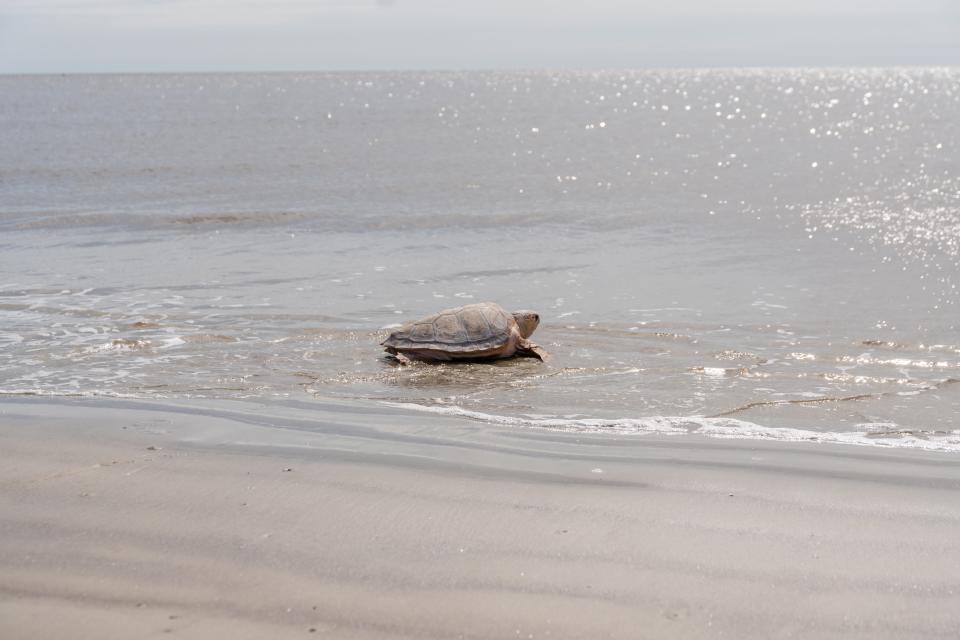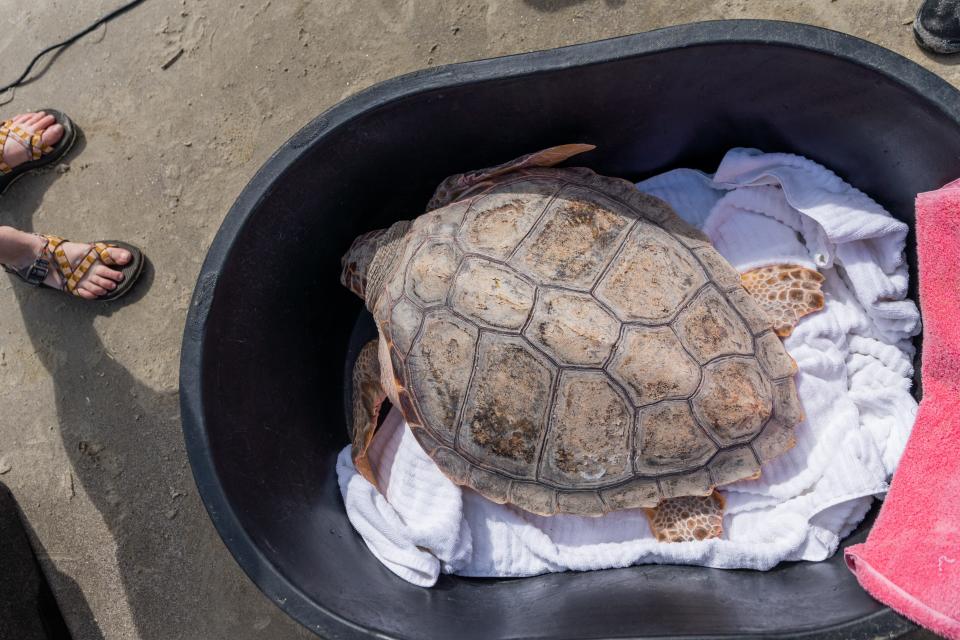New England, Georgia aquariums release sea turtles rescued on Cape Cod
Editor's note: Photos in an earlier version of this story were incorrectly captioned. All photos in this story were taken in Georgia.
The New England Aquarium released two dozen sea turtles back in the ocean waters off North Carolina on Monday, after the turtles received months of rehabilitative care for cold-stunning.
The turtles were rescued from Cape Cod Bay, after they were found suffering from cold-stunning — a condition in which sea turtles become weak and inactive from exposure to extreme cold temperatures.
Twenty-three of the turtles were Kemp's ridley sea turtles and one was a green sea turtle, both are endangered species, according to rescue biologist Alessia Brugnara of the New England Aquarium. All 24 turtles were rescued from November through January, she said.

Staff and volunteers from Mass Audubon’s Wellfleet Bay Wildlife Sanctuary rescued the turtles. The turtles spent months at the Aquarium’s Sea Turtle Hospital in Quincy, undergoing treatment for conditions including pneumonia, dehydration and bone fractures.
“The turtles completed their rehabilitation at the New England Aquarium Sea Turtle Hospital, and they were deemed ready for release by our veterinary staff and the farthest north we could release them was Fort Fisher in North Carolina because that was the water temperature that was warm enough for them,” said Brugnara.
What is cold-stunning?
According to the New England Aquarium, cold-stunning occurs when sea turtles, foraging along the New England coast during the summer, become trapped in Cape Cod Bay in late fall or early winter.
The cold-stunning and stranding of sea turtles is an annual phenomenon that happens when turtles on the northside of Cape Cod cannot navigate around Provincetown out of Cape Cod Bay to migrate to warmer waters before the temperatures drop for the season. As water and air temperatures gradually drop, turtles become hypothermic and eventually stop swimming.

Gardening: 'Hydrangea hysteria' and dead roses: February cold snap takes toll on Cape Cod plants
The turtles develop medical problems like pneumonia and severe dehydration. Their body temperatures can drop down below 50 degrees from their usual 70 degrees. During treatment, they need to be slowly warmed over time until they regain their normal body temperature.
“This year, we had 518 live turtle intakes, which is our third largest intake for cold stuns ever,” said Brugnara. The remaining 26 turtles at the Aquarium facility will be released off Cape Cod in the summer, once the waters of Nantucket Sound have warmed.
Aquarium staff, volunteers, and interns have a tradition of naming the turtles receiving months-long care. Among those released this week were Fusilli, Pastine, Gemelli and Udon — in keeping with this year’s naming theme of pasta and noodles.

Georgia Aquarium also released eight turtles rescued from the Cape
The Georgia Sea Turtle Center, in collaboration with The Georgia Aquarium, released eight turtles — six Kemp's ridley and two Loggerhead sea turtles, off the coast of Georgia on Jekyll Island. Georgia Aquarium took in 11 sea turtles in total, rescued from the Cape Cod Bay, including four loggerheads and seven Kemp’s ridleys.
Along with the National Oceanic and Atmospheric Administration (NOAA), the Aquarium comes together to help sea turtles during cold-stunning events. The New England Aquarium was the facility that originally took in these turtles. It, along with Georgia Aquarium, are a part of a large multi-institutional network of zoos, aquariums and rescue organizations that aid in saving hundreds of turtles each year.
Shark watch: Drones flown at Cape Cod beaches this summer are looking for sharks. Here's why.
“We have teamed up with Georgia Sea Turtle Center in the past on previous sea turtle releases. This year, they assisted in our release of eight sea turtles and will continue to care for three of the sea turtles who need some additional treatment before they will be ready to be released back into the ocean,” said Hannah Hardwick, public relations specialist for the Georgia Aquarium.
Loggerheads James Bond and Sandy, along with Kemp's ridley — Hemsworth, Zeta, Momoa, Spike, Connery and Beaker were released.
According to Hardwick, those turtles arrived at the Georgia Aquarium in November and three of the turtles are still undergoing further evaluation and may stay on Jekyll Island longer for further care and future release.
Rasheek Tabassum Mujib writes about healthcare and education. Reach her at mujib@capecodonline.com.
Thanks to our subscribers, who help make this coverage possible. If you are not a subscriber, please consider supporting quality local journalism with a Cape Cod Times subscription. Here are our subscription plans.
This article originally appeared on Cape Cod Times: Two dozen sea turtles rescued on Cape Cod are released following care

